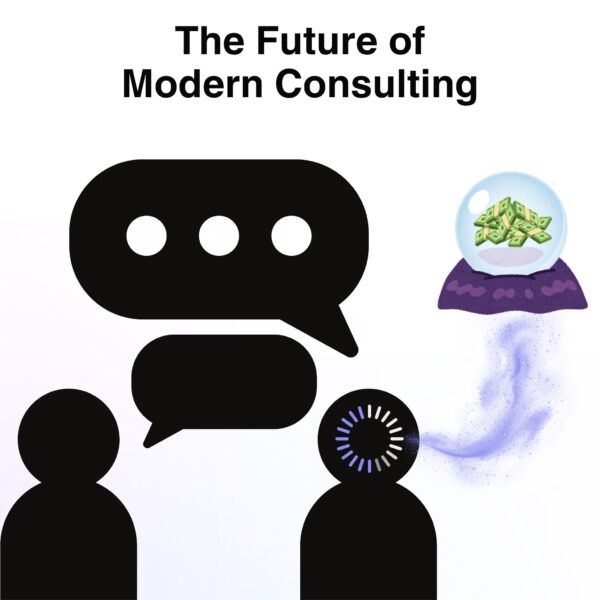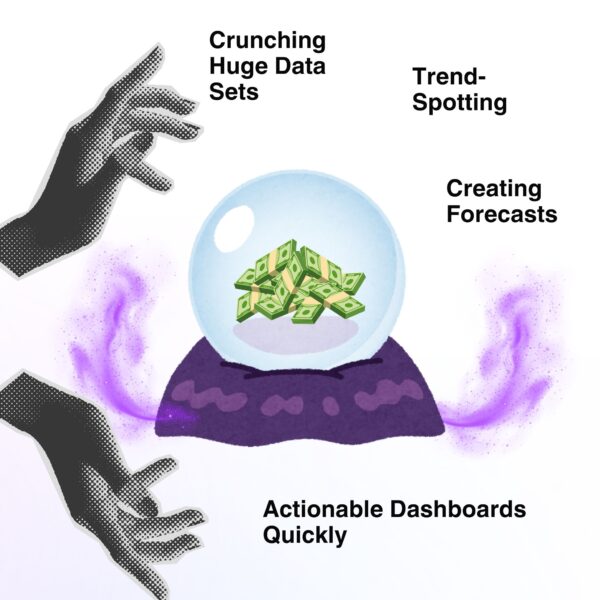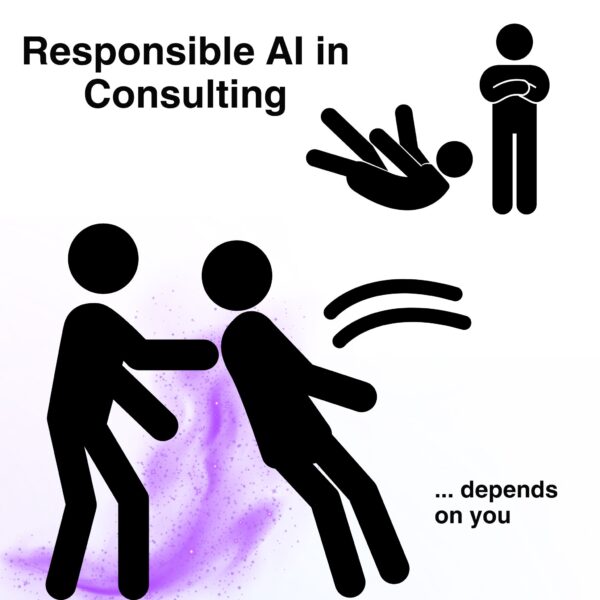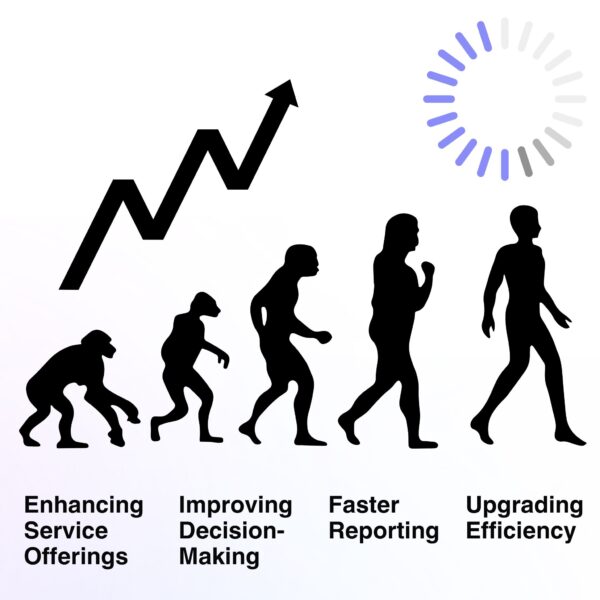The consulting world is changing fast. If you’re still running endless spreadsheets and writing proposals from scratch, you’re already behind. AI isn’t just a buzzword—it’s become the backbone of modern consulting, quietly transforming how consultants operate, serve clients, and grow their practices. This guide will unpack the best AI tools for consultants, show you how real firms are using them, and help you spot the strategic opportunities (and pitfalls) ahead.
Here’s the reality: your clients are likely already embracing AI consulting tools to analyze data, uncover insights, and arrive at decisions faster than ever. Odds are, your competitors are, too. If you’re not leveraging AI for consultants—or at least exploring how companies using AI for consulting gain their edge—you’re taking a far bigger risk than the occasional client who questions new technology. Today, the real danger isn’t adopting AI and fielding one complaint out of ten; it’s falling behind while everyone else races ahead with smarter, faster, and more data-driven consulting solutions.
Why AI Matters for Modern Consultants
AI is fundamentally reshaping the consulting industry, moving it from a traditional, labor-intensive model to a new era where technology amplifies human expertise. Today, smarter recommendations, faster deliverables, and deeper client impact aren’t just nice-to-haves—they’re the new standard.
Consider these powerful stats about AI in the consulting industry:
” 62% of consulting firms have adopted AI in some form, from data analytics to client personalization 85% of top-tier firms are planning to expand their AI capabilities in the next two years”
The message is clear: if you’re not already exploring or implementing AI consulting tools, you risk falling behind the curve. We’ve seen firsthand how automating project research and repetitive tasks with AI tools can cut prep time in half—freeing up valuable hours for high-level strategic thinking and client engagement. And we’re not alone. Industry reports show consultants can see up to a 35% jump in operational efficiency after adopting AI.
In a field where speed and insight are everything, adopting AI isn’t just about keeping up—it’s about staying ahead. The firms that embrace AI now are setting themselves up to deliver more value, win more business, and remain indispensable to their clients.

Top Solutions – AI Tools for Consultants
Consultants now have a dizzying array of AI-powered options. Some automate grunt work; others unlock insights from massive data sets. Here’s what’s making a difference in the field:
Content Generation & Writing
- Go-to tools: Jasper, Grammarly, Custom GPTs
- Use cases: Drafting reports, proposals, presentations; catching grammar slip-ups or accidental plagiarism
- Example: “I wrote a 20-page proposal with Jasper in under an hour—a process that used to take all day” – Jasper’s Text Summarizer template allows its users to enter all the way to 12,000 characters of original text, which it the user can then summarize in 25 languages.
- Example: As highlighted in the article Top Management Consulting Tools 2023:
“The life of a management consultant is often hectic, with seemingly endless tasks to juggle on any given day. However, efficient organization, staying on track, focus, and productivity are essential for consultants. Thankfully, several tools and software help them manage their time and get the most out of their day. These tools help minimize the time required for recurring mundane tasks and maximize the time spent solving problems for their clients.”
The article further explains that the best AI-powered writing assistants empower consultants to draft, check, and polish documents with far greater speed and confidence, freeing up more time for high-value, client-facing work.
-
- Example: Check out this Reddit Thread on r/consulting where consultants share practical ways they use AI for writing and productivity.
“Hey chat, is this sentence correct” in my chatGpt history” – Anonim0use84 •
Data Analysis & Intelligence
- Go-to tools: Capital IQ, Bloomberg, Crunchbase, TapClicks
- Use cases: Crunching huge data sets, trend-spotting, creating forecasts
- Tools like TapClicks helps consultants process large and complex datasets and generate actionable dashboards quickly.
- The data you could be using will depend on your clients and their industry, but so far, the sky’s the limit if you have the resources. AskBrian AI reminds us that:
“Data, statistics and research reports offer consultants key insights for their projects. The leading statistics and research firms support consultants with trends and statistics on markets, industries, consumers, economics, demographics, etc.”
With the right AI-powered data analysis and intelligence tools at their fingertips, consultants can move beyond guesswork and intuition—delivering sharper insights, more strategic recommendations, and a measurable edge for every client they serve.

Workflow Automation & Productivity
- Go-to tools: Notion, Tegus, SlideAI, Otter.ai
- Use cases: Automating admin, organizing notes, managing projects
- Real story: With Gemini – note taking, I stopped taking manual meeting notes—the tool captures and summarizes everything for me. There are also tools like Otter AI; saving professionals and teams an average of 4 hours a week..
Translation & Transcription
- Go-to tools: DeepL, Google Translate, Otter.ai, Fireflies.ai
- Use cases: Real-time translation, speech-to-text
- Global consulting teams rely on DeepL to break language barriers with clients
Q&A and Research
- Go-to tools: OpenAI, Wolfram Alpha, Aurora, Perplexity
- Use cases: Instant answers on unfamiliar topics, synthesizing research
- I’ve been using Aurora to process and summarize information in order to create Q&A questions and deliver research reports. It’s knowledge base feature really works wonderfully, like a brain outside of my brain.
Take a peak at this guidebook on how to save 10 hours of work to create high level leadership content.
Slide Beautification & Presentation Making
- Go-to tools: Beautiful.ai, Uizard, Aurora Slides
- Use cases: Turning rough bullet points into polished slides, fast
- One of the biggest pain points for consultants is transforming raw notes and scattered ideas into client-ready, visually compelling presentations—especially when time is tight. Tools like Aurora Slides can cut design time from 45 minutes to just 5, but many consultants still patch together multiple apps to get the job done. For example, as shared by a user on r/consulting:
“I use my pixel phone’s recorder app to transcribe the meeting. Then I send the text file to my work email to use my work chatbot to summarize the meeting.
I dump the actions identified in an excel file with a connection to MS Planner to automatically assign tasks. What used to be an hour at the most workflow now only takes me 10 minutes at the most.
I dump the summary in a PowerPoint template using copilot and it spits out a deck I can send to all stakeholders. This shrank the time I spent making these slides from 45 minutes to 5 minutes.
AI’s been great for me overall.” – 2hundred31 •
The process is pretty straight-forward: AI can automate the grind of transcription, task assignment, summarization, and even deck formatting—leaving you to focus on the actual story you want to tell.
For consultants wanting to elevate their slides to true McKinsey-level quality, the “How to Use ChatGPT 4o to Make McKinsey Level Presentations” video provides some key tips:
- Start with your story, not the slides. Use frameworks like SCQA (Situation, Complication, Question, Answer) to clarify your narrative before you design.
- Lead with the takeaway. Don’t bury your conclusion—make your main point clear upfront.
- Keep slides clean and organized. Use one idea per slide, sentence-case headlines, consistent fonts, and minimal color for a professional, trustworthy feel.
- Let AI handle the heavy lifting. ChatGPT 4o can turn even a rough sketch or photo of your diagram into a polished, slide-ready visual.
- Be specific in your prompts. The more context and instruction you give the AI, the more “consulting-firm” your final slides will look.
- Focus on insights, not just data. Use charts and visuals only when they make your point clearer, not just to show numbers.
By combining the right AI tools with these best practices, even consultants with zero design background can deliver presentations that impress clients, clarify strategy, and save valuable time.
Watch the full video here:
Proprietary/In-House AI Solutions
- Go-to tools: Lilli (McKinsey), Dela™ (Deltek)
- Use cases: Secure proposal drafting, knowledge retrieval
- Firms like McKinsey built custom AI, like Lili launched back in 2023; to protect sensitive client data and streamline internal workflows.
- And in Reddit, some users believe most big consulting agencies are also doing the same or will do the same at some point. This person elaborated as follows:
“Yeah. Management consulting companies are experts in AI and create their own in house versions from scratch because theyre essentially secretly big tech companies and the people working at them as management consultants fresh out of business school likely have both an extensive software engineering skillset and the time between management consulting gigs to build their own versions from scratch that can rival chatgpt because management consultants can solve business problem by breaking that problem down and applying a framework and creating their own AI is just another business problem when you think about it so it shouldnt be a surprise thst management consultants regularly build their own AI and other software in house.” – [user deleted] •• Edited
AI and the Consulting Workflow
AI isn’t just a new tool—it’s a new way of working. From contract to close, consulting tasks are being reimagined:
- Automated project research and data crunching
- Proposal and report drafting
- CRM updates and client comms
- Instant meeting notes and follow-ups
The numbers:
- 35% average operational efficiency improvement related to dealing with clients
- MIT found a 44% time savings for professional writing tasks with AI
- 70% cut (which is HUGE) in programming time, according to Microsoft. So what’s the relationship of this stat with their workflow? Well, now gifted performers can focus less in the actual programming of a project, and more in becoming full-service devoted consultants. Shifting not only their day-to-day workflow but also their entire career path if they get lucky.
AI-Powered Presentations for Consultants
Every consultant faces the challenge of turning messy notes, meeting transcripts, and rough drafts into a polished presentation—often under tight deadlines. That’s where Aurora Slides steps in, offering an AI-powered way to transform unstructured information into clear, client-ready decks in minutes, not hours.
Watch Aurora Slides in real-time:
Consultants + Aurora Slides
- Dynamic Storytelling from Any Source: Drop in your meeting notes, bullet points, or call transcripts—Aurora Slides’ AI instantly organizes and transforms them into a compelling, audience-ready narrative.
- Designer Templates, No Design Skills Needed: Instantly apply world-class, on-brand templates to your presentations. Even if design isn’t your thing, your work will look sharp and professional.
- Intelligent Content & Visual Mapping: Aurora Slides interprets your information and automatically matches it with effective layouts and visuals. You focus on insights, Aurora handles style and structure.
- Conversational Editing: Just tell Aurora Slides what you want—refine the language, split up a slide, or change the tone. Think of it as having a real-time AI assistant at your side.
- Adaptive Layouts: Need to pivot from a project update to a client pitch? Switch slide layouts on the fly, and Aurora Slides remaps your content instantly.
- Seamless Collaboration: Set permissions, share links, and present live—perfect for remote teams and fast-paced client engagements.
- Transparency and Control: Real-time feedback and clear notifications keep you in control of your content at every step.
- Personalization: Define your audience and goals upfront, and Aurora Slides will tailor both the narrative and visuals for maximum impact.
Aurora Slides is a force-multiplier for consultants who juggle multiple projects, need to impress clients, and crave efficiency. Imagine prepping for a proposal call in 10 minutes instead of two hours, or transforming a brainstorming session into a strategy deck while the ideas are still fresh. With Aurora Slides, you spend less time formatting and more time delivering value to your clients.
Now don’t imagine anymore, and test it yourself.
The Consultant’s Evolving Role in the AI Era
Let’s be clear: AI is a powerful assistant—not a replacement. Consultants still bring the judgment, creativity, and client empathy that machines can’t match.
Skills that matter more than ever:
- Strategic planning and big-picture problem-solving
- Relationship building and leadership
- Emotional intelligence and adaptability
Upskilling is non-negotiable:
The article “Future of Leadership and Consulting in the Age of AI: A Decade On” states it very clearly:
“40% of the global workforce may require reskilling due to AI and automation in the next three years”
Market Trends and Adoption Rates
AI consulting is booming—and there’s no sign of a slowdown.
- The global AI consulting market could hit $90.99 billion by 2035.
- Industry-specific adoption: Finance and Banking Sector is a big one accounting for 22.3%,.Healthcare and Life Science an impressive 25%
- Clients now demand deep domain-specific expertise—specialist firms are outperforming generalists. How do you think this could be achieved faster?
Ethical Considerations and Responsible AI
AI brings new risks: bias, privacy breaches, black-box decisions. Consultants are responsible for using AI ethically and transparently.
- Responsible AI is paramount for building and maintaining client trust.
- Data privacy and regulatory compliance (GDPR-style privacy rules, etc.) are non-negotiable. A great advice Cal Hewitt shared in their Medium Article “AI Ethics in Consulting: When Should You Say No to a Project?” is: Mandatory Ethics Training
“Require all delivery team members to complete ethics instruction before contributing to client projects covering responsible AI best practices, ethical dilemmas, recognizing issues, speaking up professionally, and more. Test comprehension and reinforce concepts through refresher courses, lunch-and-learns from legal/compliance experts, and drawing insights from case studies.”
- Humans must remain in the loop and assume ultimate responsibility for AI usage. As Eller College’s article “10 Ethical Considerations Shaping the Future of AI in Business” states:
“The most significant ethical shift we’ll witness is businesses being compelled to delineate between “AI-assisted human” and “human-supervised AI.””
By prioritizing responsibility, transparency, and continuous ethical education, consultants can harness the power of AI while safeguarding trust and integrity—for their clients, their teams, and the future of the profession.

Real-World Perspectives:
Practitioner Insights
The conversation about AI in consulting isn’t just happening in boardrooms and industry reports—it’s alive and well in the trenches, where practicing consultants share their day-to-day realities online. On Reddit, many consultants describe how AI tools have become game-changers, making them feel “superhuman” in terms of efficiency and reach. But there’s a consistent refrain: the human element—judgment, experience, and nuance—remains irreplaceable when it comes to building trust and driving real client results.
One particular answer that stood out to me was in response to the question, “Will AI Gonna Crush Management Consultants? The Truth About the Future of Expertise”:
“One of my favourite things to say to students is “In theory, there is no difference between theory and practice, but in practice, there is.”
AI is awesome with theory, not so great with practice. For a struggling business, they need the experience to help them, not an AI to just tell them to “increase revenue and decrease expenses.”
Having said that, a consultant using AI tools is likely much more efficient and faster than a consultant without.” – Motor-Pomegranate831 •
This comment captures the heart of the matter. AI and consulting tools are phenomenal at crunching numbers, surfacing insights, and accelerating routine tasks. But when it comes to translating those insights into nuanced, actionable strategies—or working through the messy, human side of organizational change—there’s no substitute for lived experience and professional judgment.
The winning formula, according to real consultants, isn’t about choosing between AI and human expertise. It’s about blending both: using AI to supercharge efficiency, but relying on the consultant’s expertise to turn theory into practice and deliver solutions that actually stick. That’s the edge clients are coming to expect—and the bar that will define the next generation of top-performing consultants.
Leading Firms; Case Studies
Artificial intelligence is increasingly changing the way work is delivered in the professional services sector, as well as the expectations of clients. Consultancy.uk recently interviewed AI strategist Walter Pasquarelli and Deltek’s Vice President of Product Management, Bret Tushaus, to explore how consultants can adapt their models to make the most out of AI’s opportunities.
The traditional model is passé. With the continued rise of AI, both Pasquarelli and Tushaus agree that the old way of doing business—charging clients based on hours worked and focusing on billable time—is on its way out.
“AI is redefining the lines between time and productivity,” says Pasquarelli.
Instead, firms are moving toward models that reward impact and expertise, not just time spent:
“Indeed, moving away from the traditional hourly rate model to one based on the impact of expertise is a significant shift in how businesses value and compensate experts. This business model emphasizes the transformative power of expertise and encourages experts to focus on delivering real value to their clients rather than just selling their time,” adds Tushaus.
This isn’t just theory—it’s already being applied at the highest levels of the industry.

Here’s how leading firms are putting these ideas into practice:
- EY:
Facing the disruption posed by AI, EY committed an initial $1.4 billion investment to a sweeping transformation initiative, aiming to become the world’s leading AI-powered professional services firm. This self-disruption required EY to reimagine everything from high-level strategy to day-to-day operations across its global, decentralized organization.As Raj Sharma, EY Global Managing Partner – Growth and Innovation, put it, EY decided to adopt:“By acting as our own ‘Client Zero’, EY is determining answers to these questions now – so that we can guide our clients based on real experience and practical use cases of AI technology.” – Raj Sharma –EY Global Managing Partner – Growth and Innovation EY’s AI transformation centers on three goals:
- Enhancing service offerings with AI-enabled solutions to drive growth and efficiency
- Redefining internal work, functions, and technology for optimal operations in the AI era
- Shaping public policy, ethics, and social agendas to promote responsible use of AI globally
These objectives not only drive long-term value and growth, but also position EY to better serve clients, strengthen internal capabilities, and positively impact society.
- Accenture:
Accenture has been a pioneer in deploying AI-driven analytics to empower business leaders with actionable insights. In one standout case study, they partnered with a global manufacturing firm struggling with data overload, fragmented systems, and slow, manual reporting. The company’s data was scattered across production lines, supply chains, sales, and customer feedback, making it nearly impossible to get a unified view or respond quickly to market changes.To solve this, Accenture designed a robust AI-powered analytics platform that integrated data from diverse sources, cleaned and normalized it, and used machine learning to provide real-time predictive analytics. Custom dashboards delivered role-specific KPIs, and automated reporting with AI-driven alerts enabled instant, data-driven decisions. As Accenture’s team put it, the platform helped “turn massive raw data into actionable insights,” allowing leaders to anticipate challenges, optimize operations, and focus on strategic growth.
The results were dramatic:
- Improved Decision-Making: Business leaders gained real-time insights, enabling faster, data-driven decisions.
- Enhanced Efficiency: Predictive analytics led to a 20% decrease in downtime and a 15% boost in productivity.
- Cost Savings: Supply chain optimization and waste reduction cut costs significantly.
- Faster Reporting: Automated reports reduced analysis time by 40%.
- Increased Customer Satisfaction: Greater understanding of customer needs led to a 25% improvement in satisfaction metrics.
Accenture’s experts note: “To remain competitive in an increasingly data-driven industry,”, “…the company needed a robust solution to unlock the potential of its data and empower leaders with real-time, actionable insights.”
- The takeaway?
AI isn’t just a new piece of software; it’s fundamentally changing how consulting firms operate, deliver value, and get paid. The firms that adapt to this shift—focusing on expertise, real client outcomes, and leveraging AI to amplify their strengths—are the ones winning in today’s market.
Conclusion & Key Takeaways
AI is changing consulting—fast. The best consultants aren’t just using these tools; they’re combining technology with human judgment to deliver smarter, faster results. Start experimenting, keep learning, and remember: AI amplifies your expertise, but it’s your insight and relationships that truly set you apart. The future of consulting is here—make sure you’re part of it.
Frequently Asked Questions (FAQs)
What are the best AI tools for consultants?
A: See the sections above for top picks in content creation, data analysis, workflow automation, and more.
How can consultants ensure ethical use of AI?
A: Stay up-to-date with privacy laws, always review and verify AI outputs, and keep humans in the loop.
Will AI replace human consultants?
A: No—AI is a force multiplier, but clients still need human judgment, creativity, and trust. Don’t forget; rather than replacing consultants, AI will augment their capabilities..
How can I start integrating AI into my consulting practice?
A: Try free or freemium AI tools in your workflow, start with low-risk tasks, and track your results. Check out this other article to discover more solutions.
How does Aurora Slides turn unstructured information into a polished presentation?
A: Aurora Slides uses AI to automatically organize, prioritize, and transform your raw notes, transcripts, or bullet points into a clear, compelling narrative. You simply upload your content in any format, and Aurora Slides instantly maps it to a professional Pitch Deck, so you can focus on your message—not the formatting.
Can I collaborate with my team or clients directly in Aurora Slides?
A: Yes! Aurora Slides is not your common AI Deck Builder since allows you to set permissions for teams and clients, share presentations instantly via public links, and manage collaborative editing in real time. This makes it easy to gather feedback, update content, and ensure everyone’s on the same page before you present.

 Managing Director at CrestVal Consulting
Managing Director at CrestVal Consulting